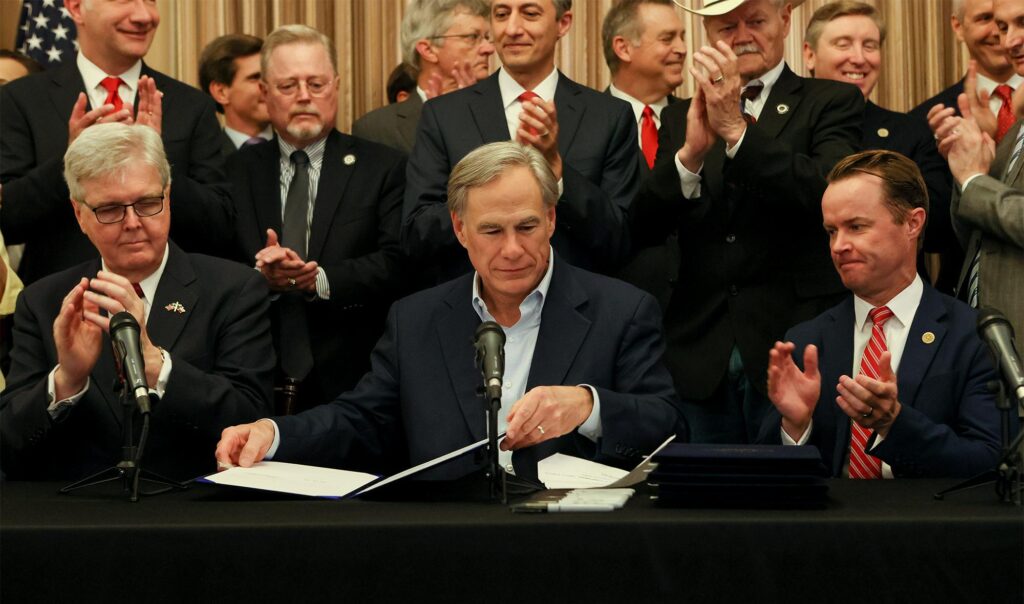You might wonder why the top state leaders have supported restrictive voting legislation, ordered audits of elections they won, and passed laws that counter what most Texans think is the proper policy on abortion or guns.
You might or might not like this answer: Those elected officials are doing what they think their voters expect.
Not all voters. Their voters.
It’s fashionable to gripe about polls, but they can expose voter sentiment and reveal, sometimes, why elected officials act the way they do.
When former President Donald Trump, who remains popular with Republican voters in Texas, pushes Republican Gov. Greg Abbott to do something — and does it publicly — it’s risky for Abbott to ignore him.
Trump’s public request for an audit of the 2020 election results in Texas — an election in which he beat Joe Biden by 5.5 percentage points — prompted a quick response: The Texas secretary of state’s office said it would conduct “a full forensic audit” of the election in Collin, Dallas, Harris and Tarrant counties. Trump won in Collin. Biden won in Dallas and Harris. The Democrat also won in Tarrant County, but only by 1,826 votes out of 834,697, according to the secretary of state’s office, Texas’ top election agency.
That year’s election in Texas got a “smooth and secure” assurance from then-Secretary of State Ruth Hughs, and no one has found evidence of widespread voter fraud in the 2020 elections.
Look at the polls. In an August survey done by the Texas Politics Project at the University of Texas at Austin, Republicans were much more skeptical than Democrats about the quality of elections.
While 68% of Democrats said they believe ineligible voters cast ballots “never” or “rarely,” 67% of Republicans said illegal votes are cast “sometimes” or “frequently.” Likewise, 91% of Democratic voters in that survey said official U.S. election results are “very” or “somewhat” accurate, while 68% of Republican voters in Texas said those results are “somewhat” or “very” inaccurate.
Numbers like those offer not-so-subtle clues for why the Republican majority in the Legislature followed Abbott in support of a restrictive election and voting bill under the slogan of “election integrity” that Democrats said would make it harder for people of color to vote.
But another survey, the University of Texas/Texas Tribune Poll in June, adds some context to the governor’s willingness to examine the ashes of the 2020 election. In that poll, voter opinions of Trump were even overall — 47% favorable, 47% unfavorable. But 86% of Republicans in Texas have favorable opinions of Trump, and those are the people who vote in GOP primaries, where Abbott will seek reelection next year. Democrats, as you would expect, had strongly unfavorable views (91%) of the former president.
By heeding Trump’s request, Abbott is sticking with voters who broadly support the former president. He’s also not leaving any space between himself and the most popular Republican in the state.
A new state law makes it legal for most adults to carry handguns without licenses or training, a proposition opposed by 57% of Texans in that June UT/TT Poll and supported by 36% overall. Crack the numbers, though, and you can see the sentiments of Republican constituents of the majority of Texas legislators: 59% support unlicensed carry, while 86% of Democrats oppose it.
Asked in that UT/TT Poll whether they would support “Making abortion illegal after 6 weeks of pregnancy except in the case of a medical emergency,” voters split, 44% in favor, 46% opposed. That proposal is now one of the strictest anti-abortion laws in the country — a law that makes abortion illegal in Texas after cardiac impulses are evident, usually at about six weeks — and is being fought in the courts. But the polling offers a clear view to what lawmakers were seeing: While only 15% of Democrats said they would support that six-week limit, 74% of Republicans supported it.
So did the Legislature, with only two Democrats joining with all of the Republicans in favor.
And some people think politicians don’t read polls.
This article was originally posted on Texas politicians are thinking what they think their voters think they should think











More Stories
Kemp signs executive order to extend suspension of Georgia’s motor fuel tax until July 14
Florida continues to outperform U.S. in economic success
Newsom announces funding expansion for reproductive services